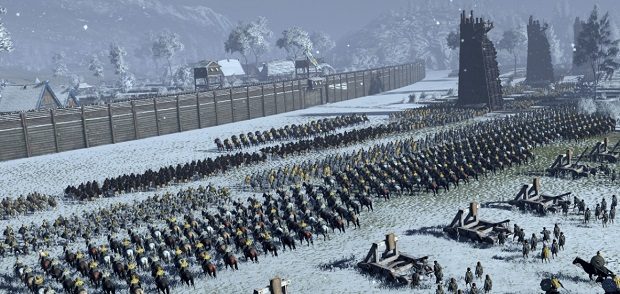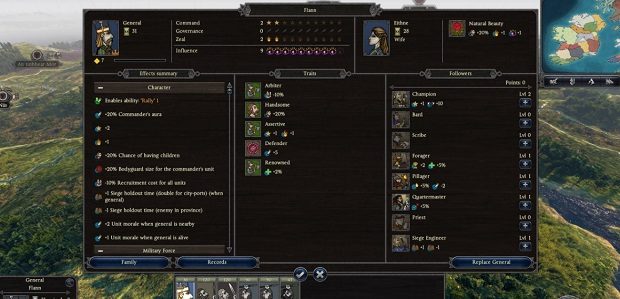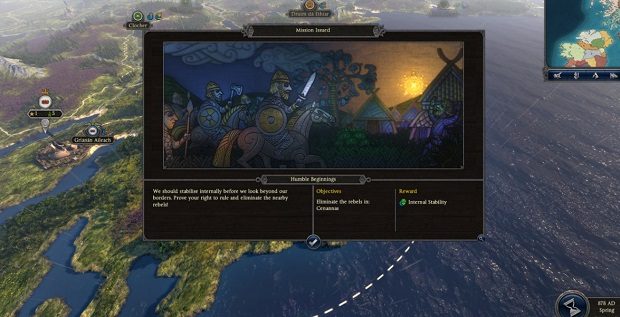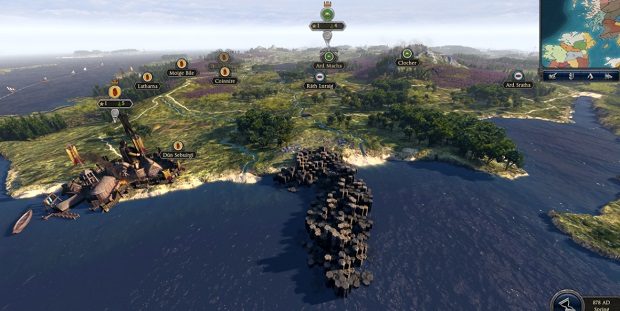Total War Saga: Thrones of Britannia is a smaller game with some very big ideas
Danelaw and order
It's not the size of the dog in the fight, it's the size of the fight in the dog. That's a useful motto, a pick-me-up for the smaller among us, but the truth is right now, I am a very small dog with very little fight left in it.
I'm the boss of Mide, a province in the middle of Ireland. The 9th century is drawing to a close and everything is in disarray. The coasts are saturated with Danes, there is no unification among my own people, and at the horizon's edge, England is burning. Total War Saga: Thrones of Britannia has a cumbersome name but it might be the leanest and meanest game in Creative Assembly's long-running strategy series. It's a little dog with a whole lot of beautiful fight in it.
When Creative Assembly announced that they'd be making some smaller historical games, covering periods that weren't quite suitable for the usual Total War epic treatment, I was as keen as mustard. I've long been of the opinion that these strategic sandboxes work best when there is a clear end-game in sight. The domination of other clans and unification of Japan, for example, in Shogun 2.
That clarity of purpose, which can get lost in the larger games, such as Rome II. Drop me into a big wide world full of possibilities and no specific goal, and I sometimes feel more constrained than I would if I had a bit of direction. Like a tourist in a new city who has done no research whatsoever, I'm likely to stick to the most brightly lit streets; free to do anything at all, but defaulting to what is right in front of my nose for fear of getting lost.
Thrones of Britannia makes things relatively simple. Whoever you are, you want to be king. That's the destination, but there's plenty of flexibility in the approach.
If you're playing as the Danes, conquering England might involve subjugating the north of England and Scotland, to use them as recruitment grounds, before turning your sights to the Anglo-Saxon strongholds of Alfred. Play as Alfred and you might try to unite your neighbours around a common cause, or dominate them so that you can bring them into the fight as your unwilling vassals rather than as allies with a will of their own.
None of those routes were open to me though. As the leader of the Mide (you may know County Meath; that's roughly where you'd locate us) I had one measly province and a whole stack of problems even before I'd started making new difficulties for myself.
Thrones of Britannia takes place after the viking invasions. It's not a game about repelling raiders on the coasts, it's a game in which the inhabitants of the isles are divided and whether your faction can be approximately described as Scottish, Irish, Danish or English, you're trying to unite rather than to defend against a common enemy. There are still raiders, their arrival foretold in newsflash-style chronicles between turns, and there's a fantastic sense of a living world beyond your own borders.
In my case, that meant hearing about raids on the South of England, a place that would be half a turn away in an ordinary Total War game, but here is effectively the other side of the world. The map is small, geographically, but it is dense, with loads of minor factions and provinces.
If Creative Assembly were simply shrinking Total War down, this whole Saga idea might be dead in the water before it even reached the shore. That's not the case though – in reducing the scale of the conflict, an opportunity has also been seized to trim some of the fat around the systems, and then to experiment with the formula that has kept these games ticking through so many eras.
There are enormous changes to the way army recruitment works, agents are completely gone, province management is streamlined and research is almost unrecognisable. It's far too soon, after playing for just over an hour, to say how well all of these changes will work but it's not too soon to say that they all make sense. I spoke to game director Jack Lusted about the changes and he explained the process of matching the specific period and scope of the game to suitable mechanics.
Total War is not, or shouldn't be, one-size-fits-all. Battles and trade and means of production have changed over time, and where possible the mechanics of the game should reflect those changes. Here, because the time-scale is narrower than in a typical historical Total War game, there's a greater emphasis on immediate results.
This is most obvious when it comes to recruitment. Units are no longer tied to a specific province but rather sit in a global pool, which replenishes over time. That means as long as an army is in friendly territory or fortified, it can receive reinforcements from that pool. Those new units won't be at full strength immediately, requiring a few turns to organise themselves and fighting at reduced power until that time, but there's no need to send units across the map from a barracks town to meet up with the bulk of your army.
The mustering penalty, that initial flimsiness, means forward planning is still required but by removing the positional requirement, Thrones changes something significant about settlements. Because units can be produced anywhere, provided the tech required is unlocked (more on that shortly), there's no need to build any of the usual barracks or training grounds. That means every available building slot in a province is free for specialisation and you won't need to go through the same build queues over and over again just to get the basics in place.
Provinces are much more like little characters now. That might seem an odd way to describe swathes of land, but I'm going to run with it. In Thrones, each province has one major settlement and a few minor ones. The major settlement might have five or six building slots, in which you can place churches, monasteries, markets or other useful things. The minor settlements just do one thing, providing additional resources and support.
You can enhance buildings in the major settlement to unlock upgrades in the minor ones, and it's a bit like levelling up skills and buffs for an RPG character. That goes for research as well, which is no longer something pursued in separation to the rest of your actions. Instead, you learn through repetition – build enough of one unit type and you'll learn how to create a better version. As with the provincial management, it should bring character to your faction, allowing you to see how the things that you set out to do directly influence the things that you can do in the future.
And when it comes to actual characters, Thrones has family trees and political actions, dilemmas and loads of traits. It's the closest a Total War game has ever felt to Crusader Kings, though the stats and relationships here are much simpler, and the number of pieces in play is much smaller.
Even in the short time I had, I managed to bring some of the other Irish clans into an almighty scrap against the Danes who had taken Dublin, and then promptly abandoned them to their fates when the noble Danes offered me a big wodge of cash. There are all sorts of manipulative tactics possible and Lusted says the personalities of leaders and factions are one of the driving forces of the game. You can see the personality type you're up against, or trying to cosy up to, at a glance, and if the game tells you that someone is untrustworthy and carelessly aggressive, you should expect them to behave that way.
My general impression is that Lusted wants to make a game in which there are very few small decisions. That has influenced how characters work, how trade works, how alliances work, and how construction and recruitment work. It's also evident in the narrative events, which don't intrude on the sandbox approach but do embellish it with faction-specific branching stories.
Almost every time you click the mouse, it should be meaningful. That's why you don't need to build a barracks or send an army traipsing across the map to collect some archers from that one town and some cavalry from the next one along. It's why the skills traditionally associated with agents in Total War are now rolled into the central characters. That serves a double-purpose: it means there are less moving pieces moving around the map and makes high-ranking generals even more valuable, and their loss even more devastating.
I spend a lot more time thinking about Total War these days than I do playing the actual games. Warhammer II has completely passed me by, not because I have no interest in it – because I don't have any spare time to dig I and learn its factions and new features. It's the battles that appeal most in Warhammer and I barely even touched the battles in this Saga because there's so much else to look at and to do. Thrones of Britannia definitely appeals to me more in terms of its setting and scale, but I think there's more to it than that.
This is a Total War game that could have been an excuse to go back to basics. Instead, it's questioning precisely what those basics should be and making some bold decisions about how to rebuild the foundations. That's very exciting indeed.
Total War Saga: Thrones of Britannia is out April 19th.





